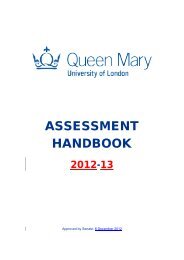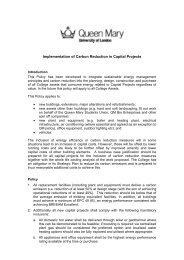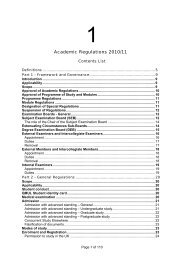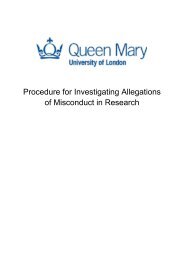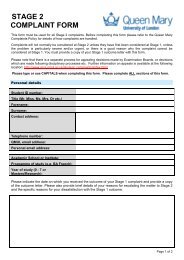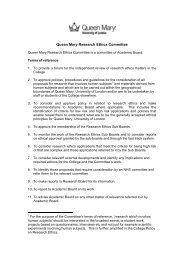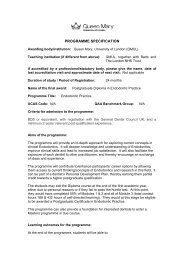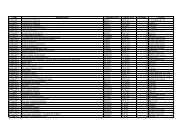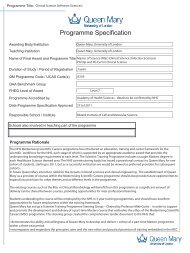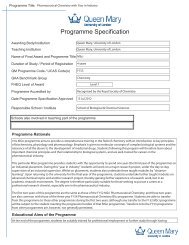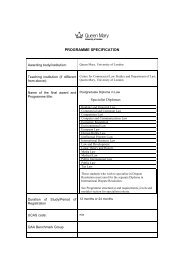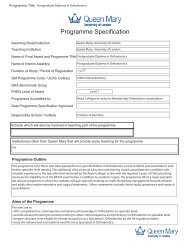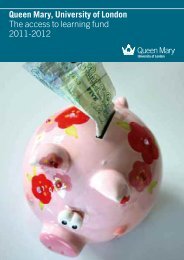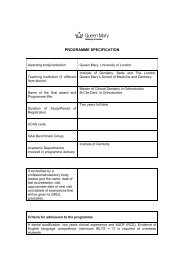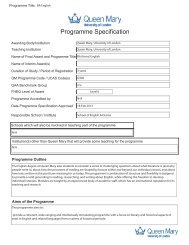Student module feedback questionnaires ...
Student module feedback questionnaires ...
Student module feedback questionnaires ...
You also want an ePaper? Increase the reach of your titles
YUMPU automatically turns print PDFs into web optimized ePapers that Google loves.
1<br />
<strong>Student</strong> <strong>module</strong> <strong>feedback</strong> <strong>questionnaires</strong>...................................................2<br />
Purpose........................................................................................................2<br />
Scope ...........................................................................................................2<br />
Process ........................................................................................................2<br />
Undergraduate <strong>module</strong>s ...........................................................................2<br />
Postgraduate <strong>module</strong>s..............................................................................3<br />
Administering paper <strong>questionnaires</strong>..........................................................3<br />
Online <strong>module</strong> evaluation.............................................................................3<br />
Collaborative and distance learning programmes.....................................3<br />
Informal <strong>feedback</strong> <strong>questionnaires</strong>.................................................................3<br />
Evaluation and consideration of the data .....................................................4<br />
Module Evaluation September 2010 Page 1 of 4
<strong>Student</strong> <strong>module</strong> <strong>feedback</strong> <strong>questionnaires</strong><br />
Purpose<br />
The purpose of this procedure is to ensure that all students are invited to give<br />
<strong>feedback</strong> on every <strong>module</strong> they take at QMUL via an anonymous <strong>module</strong> evaluation<br />
questionnaire, and that such <strong>feedback</strong> is collated and used systematically to assure<br />
and enhance the quality of QMUL’s taught provision.<br />
The questionnaire will cover teaching and assessment, academic support, resource<br />
allocation and <strong>module</strong> organisation, with students also encouraged to give <strong>feedback</strong><br />
on how the <strong>module</strong> could be improved.<br />
Scope<br />
It is intended that this procedure covers all Queen Mary undergraduate and taught<br />
postgraduate programmes, including collaborative or distance learning programmes.<br />
It does not cover research degrees or non-award bearing continuing education.<br />
Process<br />
Heads of Schools should ensure that anonymous <strong>module</strong> evaluation takes place for<br />
all taught provision within their school, and that it is operated in a consistent and<br />
transparent way. Heads should nominate a specific member of academic staff to coordinate<br />
and administer the process, for example the Chair of the Teaching and<br />
Learning Committee, or of the <strong>Student</strong> Staff Liaison Committee.<br />
Undergraduate <strong>module</strong>s<br />
In 2010-11 QMUL will be operating a new, centrally administered system for<br />
anonymous <strong>module</strong> evaluation. In the pilot phase this will apply only to<br />
undergraduate programmes, with the intention of later rolling it out for all taught<br />
provision. QMUL, to ensure high completion rates, has decided to operate a paper<br />
questionnaire that will be optically read for fast data collection and processing, and<br />
will also provide space for students to give comments. The forms will be returned to<br />
schools/institutes after processing so that free-text responses can be evaluated.<br />
Planning will be responsible for overseeing analysis of <strong>module</strong> evaluation data for the<br />
College, and will return the data to Heads of Schools/Institutes and the Deans for<br />
Taught Programmes (or equivalent), taking care to clearly identify any <strong>module</strong>s<br />
where the data indicates potential concerns. The Head of the School or Institute<br />
should review the data and satisfy him/herself that there are no urgent issues<br />
needing immediate attention, before passing on the free-text responses so that the<br />
Module Evaluation Coordinator can assess them.<br />
The QMUL questionnaire is quite short in order to minimise the risk of questionnaire<br />
‘fatigue’ by students. It has 10 statements against which students should make a<br />
response using a five-point Likert scale. Of these, seven statements will be core<br />
QMUL evaluation questions that all students will be asked to address; three<br />
statements will be provided by schools/institutes/disciplines to address their needs.<br />
QMUL has adopted a five-point scale because it is used in the NSS, and hence this<br />
will give some limited comparison with NSS data plus staff should have some<br />
experience in gauging the meaning of scores on a 5 point Likert scale. Additionally<br />
HEFCE has established a benchmark of 4.0 as acceptable for NSS scores, and this<br />
can reasonably be used as an (informal) benchmark for <strong>module</strong> evaluation scores.<br />
Module Evaluation September 2010 Page 2 of 4
Postgraduate <strong>module</strong>s<br />
Questionnaires should cover teaching, academic support, resource allocation and<br />
<strong>module</strong> organisation, with students also encouraged to give free-text comments,<br />
including <strong>feedback</strong> on how the <strong>module</strong> could be improved. The Learning Institute<br />
can be contacted for further advice on <strong>module</strong> evaluation <strong>questionnaires</strong>. The<br />
Module Evaluation Coordinator should analyse the data and provide summaries for<br />
the Head of School/Institute, who should satisfy him/herself that there are no urgent<br />
issues needing immediate attention.<br />
Administering paper <strong>questionnaires</strong><br />
The forms for <strong>module</strong> evaluation should be administered to students in week 9, 10 or<br />
11 of the semester or other agreed times where <strong>module</strong>s run outside the two<br />
standard semesters.<br />
<strong>Student</strong>s should be allowed reasonable time to complete <strong>questionnaires</strong> at the end of<br />
timetabled sessions. Staff teaching <strong>module</strong>s should give students information about<br />
the value of the exercise, give guidance on how to correctly complete the form and<br />
reassure students that the process is anonymous. Staff should then leave and a<br />
student volunteer or volunteers should give a questionnaire to everyone in the class<br />
and collect them at the end. The student volunteer(s) should then seal the<br />
<strong>questionnaires</strong> in an envelope provided by the School for the purpose and then<br />
deliver them immediately to the school/institute office.<br />
Online <strong>module</strong> evaluation<br />
There may be good reasons why not all schools/institutes/disciplines can or should<br />
use the centrally-administered QMUL evaluation scheme for undergraduate <strong>module</strong>s,<br />
for example some schools have their own on-one systems with good return rates.<br />
Where such a case can be made and data reliably collected, then the school or<br />
institute should provide data for the seven core QMUL evaluation questions and in a<br />
comparable format to that collected through the QMUL scheme for undergraduate<br />
<strong>module</strong>s, i.e. using the 5 point Likert scale. Only schools and institutes who are able<br />
to provide data in this form will be able to opt out of the central system.<br />
Schools/institutes/disciplines using online <strong>module</strong> evaluation (for undergraduate or<br />
postgraduate students) should ensure that their systems guarantee genuine<br />
anonymity for respondents. If students are asked to take the survey in a timetabled<br />
session then staff teaching the session should give students information about the<br />
value of the exercise, give guidance on how to log on to the questionnaire and should<br />
reassure students that the process is anonymous, before leaving so that students<br />
can complete the survey confidentially.<br />
Collaborative and distance learning programmes<br />
While a paper-based system of <strong>module</strong> evaluation is preferred because of its good<br />
return rates, for some collaborative provision and for distance learning programmes<br />
<strong>module</strong> evaluation may need to be operated online. While distance learning<br />
<strong>questionnaires</strong> may not be able to cover teaching, they should still be used to gather<br />
<strong>feedback</strong> on delivery (i.e. is the delivery of learning materials, however achieved,<br />
secure, reliable and fit for purpose), academic support and assessment, with<br />
students also encouraged to give <strong>feedback</strong> on how the <strong>module</strong> could be improved.<br />
Informal <strong>feedback</strong> <strong>questionnaires</strong><br />
Several schools/institutes/disciplines run mid-semester informal <strong>module</strong> evaluation<br />
<strong>questionnaires</strong> in order that the current cohort can benefit from immediate action<br />
taken in response. Schools and institutes are encouraged to continue and expand<br />
this good practice.<br />
Module Evaluation September 2010 Page 3 of 4
Evaluation and consideration of the data<br />
Module evaluation data should be made widely available to students in each<br />
school/institute/discipline. Summaries of <strong>module</strong> evaluation data should be made<br />
available on websites and discussed with students at <strong>Student</strong>-Staff Liaison<br />
Committees. Verbatim free-text comments should not be shared with students<br />
unless the Module Evaluation Coordinator has ‘cleaned’ the comments to remove<br />
any remarks that could identify any individual, whether student or staff. Schools and<br />
Institutes should ensure that students are kept informed of the actions taken and<br />
outcomes achieved where problematic issues have been identified. When feeding<br />
back to students it is good practice to use the approach of ‘this is what you have told<br />
us’… ‘this is what we have done’.<br />
After the SSLC has considered it, <strong>module</strong> evaluation data should then be seen by<br />
Teaching and Learning Committees, together with any comments from the SSLC.<br />
Any issues identified as needing more consideration should be forwarded to<br />
School/Institute Boards for further consideration.<br />
Within faculties the Dean for Taught Programmes (or equivalent) is responsible for<br />
monitoring <strong>module</strong> evaluation and its operation across all schools/institutes, and will<br />
also consider summary data for all <strong>module</strong> evaluation within the faculty. For the<br />
purposes of monitoring across the institution, summary data will be provided,<br />
together with a commentary, in the School’s annual programme review, and will be<br />
considered in the two annual summary reports on undergraduate and postgraduate<br />
annual programme reviews written by the Academic Registry and Council<br />
Secretariat.<br />
September 2010<br />
Module Evaluation September 2010 Page 4 of 4



